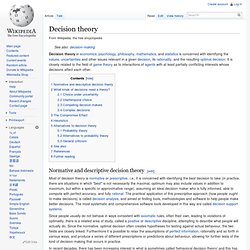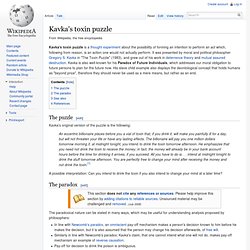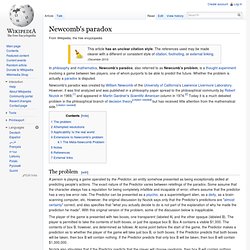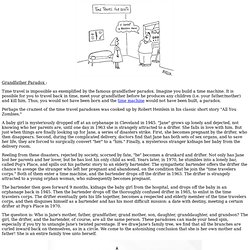

Decision theory. Normative and descriptive decision theory[edit] Since people usually do not behave in ways consistent with axiomatic rules, often their own, leading to violations of optimality, there is a related area of study, called a positive or descriptive discipline, attempting to describe what people will actually do.

Since the normative, optimal decision often creates hypotheses for testing against actual behaviour, the two fields are closely linked. Furthermore it is possible to relax the assumptions of perfect information, rationality and so forth in various ways, and produce a series of different prescriptions or predictions about behaviour, allowing for further tests of the kind of decision-making that occurs in practice. In recent decades, there has been increasing interest in what is sometimes called 'behavioral decision theory' and this has contributed to a re-evaluation of what rational decision-making requires.[1] What kinds of decisions need a theory?
Choice under uncertainty[edit] Kavka's toxin puzzle. Kavka's toxin puzzle is a thought experiment about the possibility of forming an intention to perform an act which, following from reason, is an action one would not actually perform.

It was presented by moral and political philosopher Gregory S. Kavka in "The Toxin Puzzle" (1983), and grew out of his work in deterrence theory and mutual assured destruction. Kavka is also well-known for his Paradox of Future Individuals, which addresses our moral obligation to future persons to plan for the future now. His slave child example also displays the deontological concept that holds humans as "beyond price", therefore they should never be used as a mere means, but rather as an end. The puzzle[edit] Kavka's original version of the puzzle is the following: An eccentric billionaire places before you a vial of toxin that, if you drink it, will make you painfully ill for a day, but will not threaten your life or have any lasting effects. The paradox[edit] See also[edit] References[edit] Newcomb's paradox. In philosophy and mathematics, Newcomb's paradox, also referred to as Newcomb's problem, is a thought experiment involving a game between two players, one of whom purports to be able to predict the future.

Whether the problem is actually a paradox is disputed. Newcomb's paradox was created by William Newcomb of the University of California's Lawrence Livermore Laboratory. However, it was first analyzed and was published in a philosophy paper spread to the philosophical community by Robert Nozick in 1969,[1] and appeared in Martin Gardner's Scientific American column in 1974.[2] Today it is a much debated problem in the philosophical branch of decision theory[citation needed] but has received little attention from the mathematical side. [citation needed] The problem[edit] A person is playing a game operated by the Predictor, an entity somehow presented as being exceptionally skilled at predicting people's actions. The second analysis suggests that taking only B is the correct option. [edit] Grandfather Paradox. Grandfather Paradox : Time travel is impossible as exemplified by the famous grandfather paradox.

Imagine you build a time machine. It is possible for you to travel back in time, meet your grandfather before he produces any children (i.e. your father/mother) and kill him. Thus, you would not have been born and the time machine would not have been built, a paradox. Perhaps the craziest of the time travel paradoxes was cooked up by Robert Heinlein in his classic short story "All You Zombies. " A baby girl is mysteriously dropped off at an orphanage in Cleveland in 1945. Reeling from these disasters, rejected by society, scorned by fate, "he" becomes a drunkard and drifter.
The bartender then goes forward 9 months, kidnaps the baby girl from the hospital, and drops off the baby in an orphanage back in 1945. The question is: Who is Jane's mother, father, grandfather, grand mother, son, daughter, granddaughter, and grandson? Excerpt from the Encyclopedia Britannica without permission. Some paradoxes - an anthology.